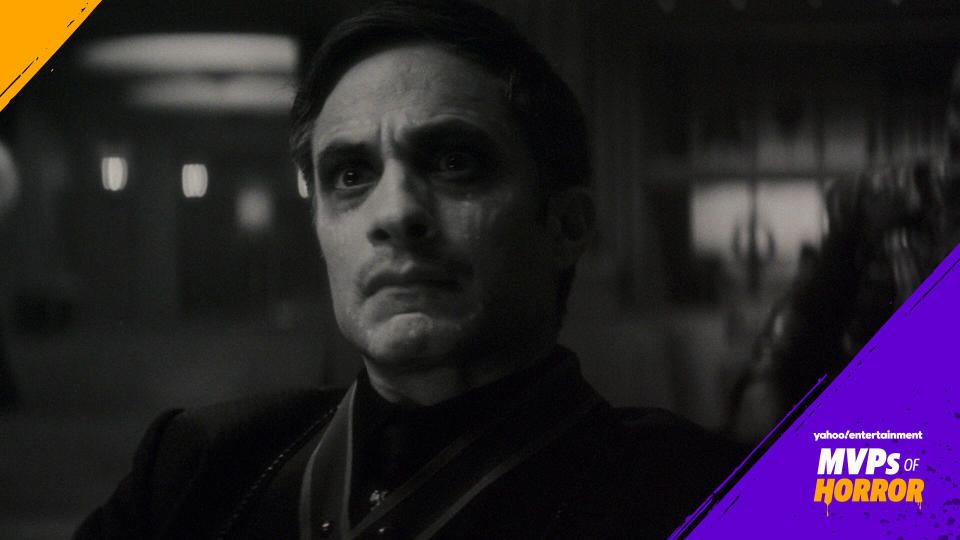There are no iron men, she hulks or scarlet witches in Marvel Studios’s new Halloween special, Werewolf by Night, but we can promise you one thing when you fire up this one-hour Disney+ one shot: There will be blood. While Doctor Strange in the Multiverse of Madness tiptoed into horror, Werewolf by Night leaps into the genre with two (furry) feet, and it has the beasts, bloodshed and body count to prove it. And director Michael Giacchino wouldn’t have it any other way.
“The joke on set was always, ‘Let me guess … you want more blood?'” the composer-turned-filmmaker tells Yahoo Entertainment with a not-at-all sinister laugh. “And I’d be like: ‘Yeah, I definitely want more!’ And I’m not a gory kind of guy — I don’t like sadistic slasher movies. But we were centering this around a real story about real people, so it just felt right to do.”
Giacchino had willing accomplices in his two stars, Gael Garcia Bernal and Laura Donnelly, who play the titular wolf man, Jack Russell and monster hunter, Elsa Bloodstone, respectively. “I was thrilled to see all the blood,” Donnelly enthuses. “There were bloody parts that I didn’t even know were coming! When I saw the special, I was surprised by them.” For his part, Bernal is thrilled to be riding a river of blood into his Marvel Cinematic Universe debut. “I feel lucky that Michael invited me into something new and different,” the actor says. “What’s interesting about horror and these characters in particular is that it can evolve into many things.”
[embedded content]
This new version of Werewolf by Night evolved out of Marvel Comics’s short-lived but impactful dalliance with horror comics in the 1970s, when the company launched titles like Morbius the Living Vampire and Tomb of Dracula. Jack Russell made his debut in a 1972 issue of Marvel Spotlight before getting his own comic that enjoyed a five-year run before getting shelved along with the rest of his monster brethren due to low sales. When Marvel Studios made the decision to re-open the books on that era, Werewolf executive producer Brian Gay says that Jack stood out as the right character to launch the horror branch of the MCU.
“We had never figured out quite where to put him in a movie or a TV show, so this special felt like the right place,” Gay says of the one-hour story, which finds Jack infiltrating a monster hunt organized by the Bloodstone family in order to rescue a fellow creature. (More on that Thing later.) “And one of the benefits is having Gael, who has such a great way of displaying emotion and and working with the other actors that you understand the duality of this character. It’s a wonderful way to be introduced to him.”
Now that those introductions are out of the way, we had Giacchino and the cast take a deeper dive into the currently-streaming Werewolf by Night for the stories behind the special’s killer cameos, connections to Marvel lore and the single bloodiest shot in MCU history. Read on … if you dare.
Blood on the glass
It’s a shot that only a truly devilish director could dream up. In the grand finale of Werewolf By Night, a wolfish Jack battles a swarm of Bloodstone goons, tearing them to shreds. The fight plays out in a single shot as the camera slowly pushes in on the action, with bad guy blood regularly splattering the lens. Giacchino says that’s one of two shots that haunted his dreams from the start of production — the other being Jack’s transformation — and he went to Herculean lengths to pull off what’s easily the most blood-soaked scene in any Marvel movie or TV series ever.
“I wanted to do it as practically as we could,” he says of the months-long process required to pull that sequence off with minimal digital assists. “The stunt people did all that, the camera was pushing forward. There were no cuts — it all actually happened in one full take. We only got two takes of that shot, because it was so hard for the stunt people to do! I think we picked the second take for the final version.”
The blood itself was a bit of backyard movie magic — although one that was again accomplished by practical means. Giacchino says that visual effects supervisor, Joe Farrell, took a pane of window glass from his under-construction house and filmed himself throwing fake blood on it in his own yard. That footage was later married to the single on-set shot that the production team pulled off. “We attached those elements to the film at the right moments,” remembers Giacchino. “I could be like: ‘It’d be great if some of the blood hit here as someone gets thrown back.’ It became so much more visceral.”
Not surprisingly, that scene is one of Bernal’s personal favorites from the special as well. “I loved it,” the star raves. “It was one of the main shots that was always conceived, and the story had to be build around it. I’m a big fan of that type of cinematic idea. In horror, sometimes, what you imagine is more scary than what you really see, but this kind of slow-moving shot is fantastic.”
Wolfing out
In real-world time, Jack Russell dates back to the ’70s. But in Marvel time, the character has been around for centuries, and that longevity is one of the things that appealed to Bernal when he was approached about joining the MCU. “What I love about werewolf mythology is that they’ve had many lives within one life — it’s a little like what actors experience as well. And what’s fascinating is that they can go anywhere: like, Jack could have become an expert in playing guitar and had a career around that. Except for every full moon!”
Meanwhile, Giacchino’s inspiration for Jack’s werewolf look in the special stretches back decades to the 1941 Lon Chaney Jr. favorite The Wolf Man, as well as David Naughton’s appearance in 1981’s An American Werewolf in London. “It’s a bit of a love letter to both of those werewolves,” the director says. And Gay adds that the make-up team followed the production’s general interest in elevating practical effects over computer generated imagery.
“In recent years, people tend to go full CG with werewolves because you can get more wolf-like characters,” the producer notes. “But we wanted Jack to have more of the Wolf Man appeal where you see the humanity. It’s important for the audience to make that connection to the character. What you see in the film is a prosthetic suit that Gael wore on the day and that had hand-stitched hair on its back. I wish I could tell you the number of hairs, but it’s a lot!”
Naturally, all that hand-sewn hair required Bernal to spend three-and-a-half hours in a make-up chair as the team brought out Jack’s wolfish side. “It might sound a little daunting, but the time passed really quickly,” the actor says. “It was very hot under that costume, though. I had to be very close to a fridge in order to feel comfortable! You also completely forget how your look, so when people see you it’s a whole different thing. It’s the only way you can howl without any sense of shame.”
Donnelly was one of those people who was caught off guard by Bernal’s transformation. “It reminded me of the horror movies I grew up watching,” she says. “There are aspects of The Wolf Man and aspects of An American Werewolf in London. I loved that we were sticking with a tribute instead of having to look at a CGI suit.”
Death becomes them
It’s been well-established by now that death is a malleable concept in the MCU. But Gay promises that people who die in Werewolf by Night will stay dead. Mostly. “I’m on the record, so I don’t know how I should answer this,” he says, laughing. “But I will say that with monster hunting — as with any big game hunting — death is the ultimate consequence.”
Among the deceased are a bevy of monster hunters, most of whom were created specifically for the special. Their ranks include a close personal friend of Giacchino’s, who also happens to be a key figure in Star Trek lore. We’re talking, of course, about Kirk R. Thatcher, best known as the “bus punk” who was on the receiving end of a Vulcan nerve pinch in The Voyage Home. (Thatcher has reprised that classic role in Spider-Man: Homecoming as well as a Season 2 episode of Star Trek: Picard.)
“Kirk is one of my best friends,” says Giacchino, who hand-picked Thatcher to play the creature slayer, Jovan. “I always knew he was a really good actor, and never had the chance to show that. So [Marvel Studios head] Kevin Feige and I both thought, ‘Let’s bring him in, give him something more to do and see how it goes.’ Kirk did a wonderful job as that character, and is just really fun to watch. He has such a great face, and that beard! It’s hard to beat that.”
While Jovan doesn’t have a comic book counterpart, there is one now-dead monster hunter who does share a name with a pre-existing character. Eugenie Bondurant plays Azarel, who has appeared in the pages of Marvel Comics as the servant of the Angel of Death. “I wouldn’t read too much into it,” Gay says when asked if the two characters are connected. “Lots of people go by different names.”
The MCU Azarel does at least go out in grand fashion, locking swords with Elsa until the youngest Bloodstone plunges a steel blade through her skull. “That was my first time doing any sword fighting,” Donnelly reveals. “I had to bring my sword back to my apartment in Atlanta and practice everything. It always feels like you’ll never quite get there in rehearsal, and then you do a take and realize, ‘Oh, I think I’ve got this!'”
As for Elsa’s finishing move — which is almost as bloody as Jack’s werewolf attacks — Donnelly says that was accomplished through clever camera trickery. “We were not using sharpened steel blades,” she jokes. “They’re pretty good about trusting actors, but I think that would be taking it too far! We accomplished that through stumped swords and certain camera angles. It was actually kind of a last-minute thing; Michael said, ‘It would be really fun if she did this instead.’ There was a lot of winging it on this project, which was great.”
It came from the swamps
Swamp Thing may be the most famous comic book elemental, but Marvel’s resident swamp creature, Man-Thing, actually predates his DC Comics rival by two months. (Both characters made their first comic appearances in 1971.) Prior to the launch of the MCU, the character even headlined his own Sci-Fi Channel original movie, although it quickly disappeared without a trace.
Because Man-Thing and Jack Russell got along famously in the pages of Marvel Comics, it shouldn’t be a surprise that Giacchino decided to replicate that friendship onscreen. In Werewolf by Night, Jack goes undercover alongside the various monster hunters to save his pal “Ted” — a reference to Man-Thing’s human self, Dr. Ted Sallis — from becoming a trophy on their mantles.
“That’s something else that attracted me to the project,” Bernal says of Jack and Ted’s odd couple relationship. “And I think it’s something that will evolve in the future. But if I told you exactly how, it would be like a magician revealing his tricks.”
Fortunately, Giacchino is more willing to reveal what was going on behind the curtain in terms of bringing Man-Thing to life onscreen. “There’s a good amount of CGI, but that was put over the top by the puppets he had made, because I wanted something for the actors to react to,” he says of the digital/practical hybrid character. “I didn’t want someone with a tennis ball on a stick: I wanted a physical representation of the character.”
That’s how actor and make-up artist Carey Jones — who has also played Predators and Wookiees — came to inhabit the oversized Man-Thing costume that Bernal interacted with on set. “Gael could act against him, and then Joe Farrell took those shots and used them as a reference for the CG elements: the lighting, the movement, all those things. There’s one or two shots in the special that are fully puppet, but the rest are an amalgam. Having a real puppet there made the CG aspects feel more real.”
Werewolf By Night is currently streaming on Disney+




